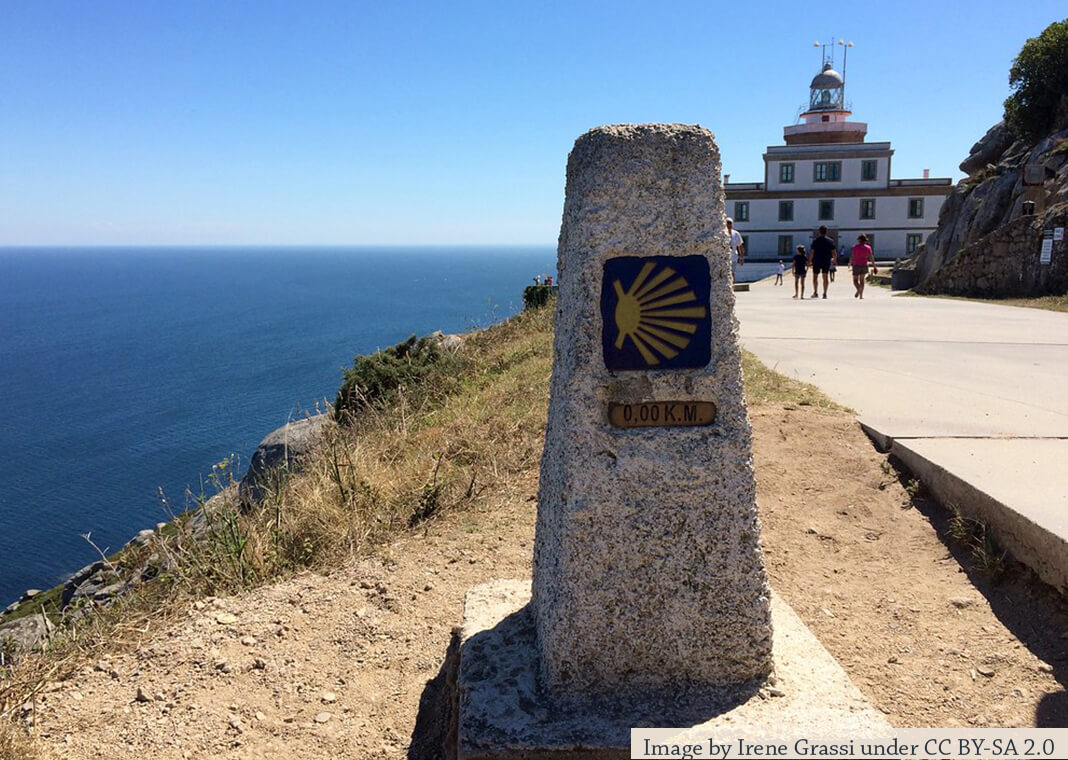
There are many prayerful routes to Santiago de Compostela, that great pilgrim destination in the northwest of Spain. The traditional Camino de Santiago route begins in France, and a less-traditional but increasingly popular route winds through Portugal. My wife and I began our trek in Sarria, some 100 kilometers from Santiago. Or, we might even say, our pilgrimage began even farther away, in our home in Baltimore, Maryland.
The Camino de Santiago begins in many different places and ways, as any good pilgrimage should. We muddle onward through life, beginning in one distinctive place and bringing to bear our own distinctive experiences. The invitation of pilgrimage is to keep our eyes both on the promise of the final destination and on the richness of the present moment, always discerning what we might discover and contribute along the way.
The destination for us—as it has been for so many—was Santiago de Compostela, specifically, the great cathedral in which the remains of the Apostle St. James (Santiago, in Spanish) are said to be buried. This final stop was never in question. After all, it’s in the very name of the pilgrimage.
Except, a pilgrim might go farther still.
I had never heard of Finisterre, the so-called “end of the world”—or at least what passed for world’s end in the European imagination before anyone sailed across the Atlantic. The coastal destination lies 90 or so kilometers beyond Santiago de Compostela; any pilgrim wishing to reach this mystical landmark begins the trek where so many other pilgrimages end.
We did not reach Finisterre on our pilgrimage. But I did note the signs, the advertisements, and the invitations. I wondered about the place. In some ways, my pilgrimage suddenly felt incomplete.
Perhaps one day I will make it to Finisterre. Perhaps I will begin at the end, walking from Santiago de Compostela. Or perhaps I will begin at the beginning, journeying all the way from France.
But what I know now—what the very challenge of Finisterre represents to all of us on our spiritual journeys—is this: those so-called destinations along our life’s pilgrimage are simply pauses. God is constantly calling us farther and inviting us deeper.
We don’t have to go all at once; none of us will see it all. That’s what makes pilgrimage so special: each life is a journey unto itself. Limited creatures that we are, we are forced to pause. We are forced to stop and settle and wait and watch.
As St. Ignatius Loyola knew well, as pilgrims, we are asked to go where God most needs us, knowing that the very place where we stop to serve and to love may be where another person starts the journey, takes up the torch, and carries on.
In the end, Finisterre is simply another place to pause the pilgrim journey. We can go farther still. But the destination is only half the equation; we must be mindful of the places in which our feet are found—and more mindful still that our destination is truly the ever-expanding embrace of God.
Image of Camino de Santiago marker on Finisterre by Irene Grassi under CC BY-SA 2.0, via Flickr.

Thank you, Eric. So true. Sometimes, when I’m feeing a bit overwhelmed by all that is on my “to-do list” and the complications of interruptions, I remember the words of a friend: “Your ministry, ” he advised,” is in the interruptions and persons that God puts into your life each day. That is God’s agenda for you, his “to-do” list for you. It’s his list that matters, not necessarily yours. It will all work out.” And pretty much it has. I’ve also learned that sometimes letting go of my expectations is the great gift of each day that’s wrapped, beginning, middle and end, in prayer about finding God in the daily things. Pausing to find God and appreciate — cherish — God’s presence.
Thanks Eric. Keep our eyes both on the promise of the final destination and on the richness of the present moment – simple yet beautiful and enriching.
Eric, you always speak to me in your writing. Here you mention someone else picking up the torch at a time when I realize that I need to do some serious succession planning for a ministry in which I’m involved. Thanks for the nudge!
So true, Eric. We never know where our journey will take us. When I entered my congregation almost 33 years ago, I never imagined that I would be the last sister to enter and to stay. We are on a new journey planning our future. I can only trust that God, who called us to this life will continue to strengthen us and give us a future full of hope.